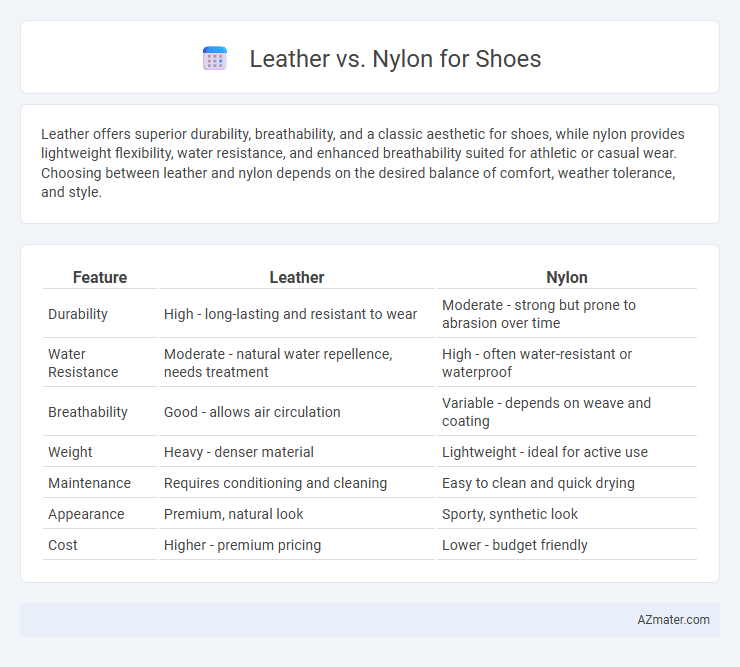Leather offers superior durability, breathability, and a classic aesthetic for shoes, while nylon provides lightweight flexibility, water resistance, and enhanced breathability suited for athletic or casual wear. Choosing between leather and nylon depends on the desired balance of comfort, weather tolerance, and style.
Table of Comparison
| Feature | Leather | Nylon |
|---|---|---|
| Durability | High - long-lasting and resistant to wear | Moderate - strong but prone to abrasion over time |
| Water Resistance | Moderate - natural water repellence, needs treatment | High - often water-resistant or waterproof |
| Breathability | Good - allows air circulation | Variable - depends on weave and coating |
| Weight | Heavy - denser material | Lightweight - ideal for active use |
| Maintenance | Requires conditioning and cleaning | Easy to clean and quick drying |
| Appearance | Premium, natural look | Sporty, synthetic look |
| Cost | Higher - premium pricing | Lower - budget friendly |
Introduction to Leather and Nylon Shoes
Leather shoes offer durability, breathability, and a classic aesthetic, making them a popular choice for formal and casual footwear. Nylon shoes provide lightweight comfort, quick-drying properties, and enhanced flexibility, often favored for athletic and outdoor activities. Understanding the unique characteristics of leather and nylon materials helps consumers select shoes tailored to specific performance and style needs.
Material Composition: Leather vs Nylon
Leather, derived from animal hides, offers a dense fibrous structure composed primarily of collagen, providing durability, breathability, and natural moisture-wicking properties. Nylon, a synthetic polymer made from polyamides, features a lightweight, flexible, and water-resistant composition with high tensile strength, making it resistant to abrasion and quick-drying. The material composition differences directly influence shoe performance, comfort, and maintenance, with leather excelling in natural durability and breathability, while nylon provides enhanced water resistance and flexibility.
Durability and Longevity Comparison
Leather shoes offer superior durability due to their natural toughness and ability to withstand wear, often lasting several years with proper care. Nylon shoes provide lightweight flexibility and quick drying but tend to show signs of wear and tear sooner, typically lasting a few seasons. Overall, leather delivers longer longevity and better resistance to abrasion and environmental factors compared to nylon.
Comfort and Fit: Which Feels Better?
Leather shoes typically offer superior comfort and fit due to their natural flexibility and ability to mold to the foot over time, reducing pressure points and providing personalized support. Nylon shoes are lightweight and breathable, which enhances comfort during extended wear, but they often lack the structured fit and adaptability that leather provides. For individuals prioritizing a snug, custom fit with long-term comfort, leather is generally the preferred material.
Breathability and Climate Suitability
Leather shoes offer superior breathability due to their natural pores, allowing moisture and heat to escape, making them ideal for warm and moderately humid climates. Nylon shoes, while lightweight and water-resistant, generally lack the same breathability, causing feet to retain more sweat and heat, which may lead to discomfort in hot weather. For colder or wetter conditions, leather provides better insulation and durability, whereas nylon excels in quick-drying and moisture-resistant properties.
Maintenance and Cleaning Requirements
Leather shoes demand regular maintenance, including cleaning with a damp cloth, conditioning to prevent cracking, and polishing to maintain their appearance and durability. Nylon shoes are easier to clean, typically requiring only soap and water without the need for conditioning or polishing, making them more resistant to stains and quick drying. The choice between leather and nylon hinges on the level of upkeep preferred, as leather offers a classic look with higher maintenance, while nylon provides practicality with minimal cleaning effort.
Style and Aesthetic Appeal
Leather shoes showcase a timeless, luxurious aesthetic with rich textures and natural patinas that enhance with wear, making them ideal for formal and classic styles. Nylon shoes offer a modern, sporty look with a lightweight, sleek finish that appeals to casual and athletic fashion trends. The choice between leather and nylon significantly impacts the style statement, balancing traditional elegance against contemporary vibrancy.
Price and Affordability
Leather shoes typically come with a higher price point due to premium materials and durability, making them a long-term investment. Nylon shoes generally offer a more affordable option, suitable for budget-conscious buyers without compromising lightweight comfort. When prioritizing price and affordability, nylon stands out as the economical choice for everyday wear.
Environmental Impact and Sustainability
Leather shoes generally have a larger environmental footprint due to the resource-intensive livestock farming, including high water usage and methane emissions. Nylon, a synthetic material derived from petrochemicals, contributes to microplastic pollution and relies on non-renewable fossil fuels, raising sustainability concerns. However, advancements in recycling technologies and alternative bio-based nylons offer potential for reduced environmental impact compared to traditional leather production.
Choosing the Right Shoe Material for Your Needs
Leather shoes offer durability, breathability, and a classic aesthetic, making them ideal for formal occasions and long-term wear. Nylon shoes provide lightweight flexibility, quick-drying properties, and enhanced breathability, perfect for sports and casual activities. Selecting the right shoe material depends on intended use, comfort preferences, and environmental conditions.

Infographic: Leather vs Nylon for Shoe
 azmater.com
azmater.com